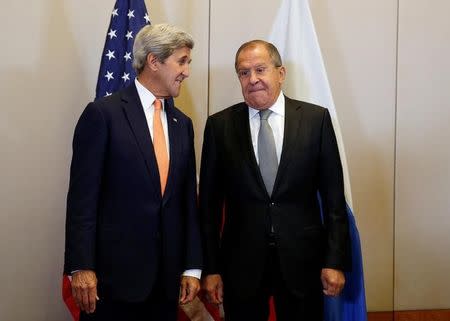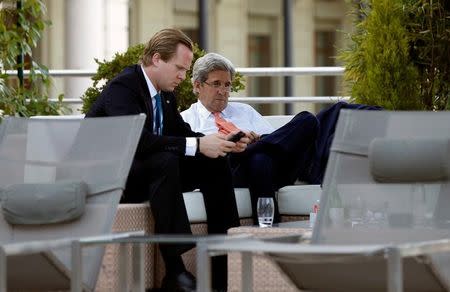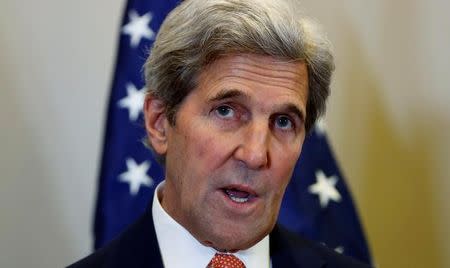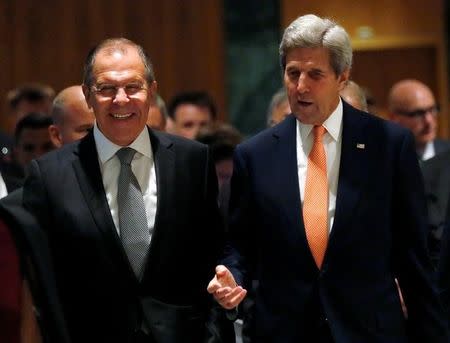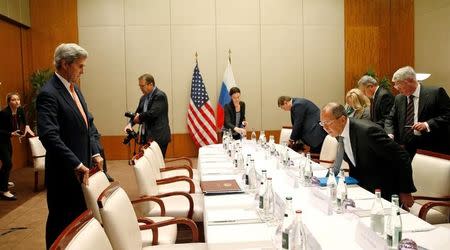U.S. says progress made in Syria talks, but unclear if final deal can be reached
By David Brunnstrom and Tom Miles GENEVA (Reuters) - The United States and Russia made progress on Friday towards advancing proposals for a nationwide ceasefire in Syria, but technical details still needed to be worked out, a senior official of the U.S. State Department said. The United States and Russia have backed opposite sides in Syria's civil war, which shows little sign of ending after 5-1/2 years of violence in which half the pre-war population has been uprooted. Moscow supports President Bashar al-Assad and Washington supports the opposition, saying Assad must go. "Discussions continue into the early evening, as technical issues are worked out between the two teams," the official said after a day of talks in Geneva between U.S. Secretary of State John Kerry and Russian Foreign Minister Sergei Lavrov. "We are not in a position right now to say whether or not a final deal can be reached." The official said the two sides were "making progress ... towards advancing proposals that would lead to a nationwide cessation of hostilities in Syria, as well as sustained and unimpeded access to humanitarian assistance for communities most in need". The United Nations said on Friday the Syrian government had effectively stopped aid convoys this month and the besieged city of Aleppo was close to running out of fuel, making the talks even more urgent. Kerry’s meeting with Lavrov is their third in two weeks and they have spoken several times by telephone to try to narrow differences on a Syrian peace plan that has been under discussion since July. Senior State Department officials briefing reporters on Kerry’s flight to Switzerland played down the prospect of a final breakthrough from Friday's talks, although they said "steady progress" had been made in recent weeks. They said they believed a deal was still possible but warned that the talks could not go on for ever. HUMANITARIAN CORRIDORS Another senior U.S. official said en route to Geneva that while Kerry would try to make progress there, "patience is not infinite" and the United States would not simply keep talking if a conclusion was not reached "relatively soon". The officials declined to elaborate on what Washington might do if the talks broke down. Kerry’s proposal for military cooperation with Russia over Syria has faced strong pushback from U.S. defence and intelligence officials who argue that Moscow cannot be trusted. The second U.S. official said one of the reasons Kerry had kept up the effort was because the Syrian opposition supported it as a way to stop the worst violence in their country. Under the plan being discussed by Kerry and Lavrov, a cessation of hostilities agreement would halt violence between rival forces and open humanitarian corridors. Russia has insisted that opposition groups must separate from al Qaeda-linked militants in cities such as Aleppo. Washington wants Assad’s air force grounded to stop its attacks on opposition forces and civilians. The second U.S. official said any agreement with Russia would have to include an end to the siege by government forces and their militia allies around Aleppo and this would be a focal point of Friday's talks. The Syrian army secured a road into the government-held side of Aleppo that was captured by rebels last month and was expected to open it soon for civilians, state-owned al-Ikhbariya TV reported on Friday. (Editing by Alison Williams)

